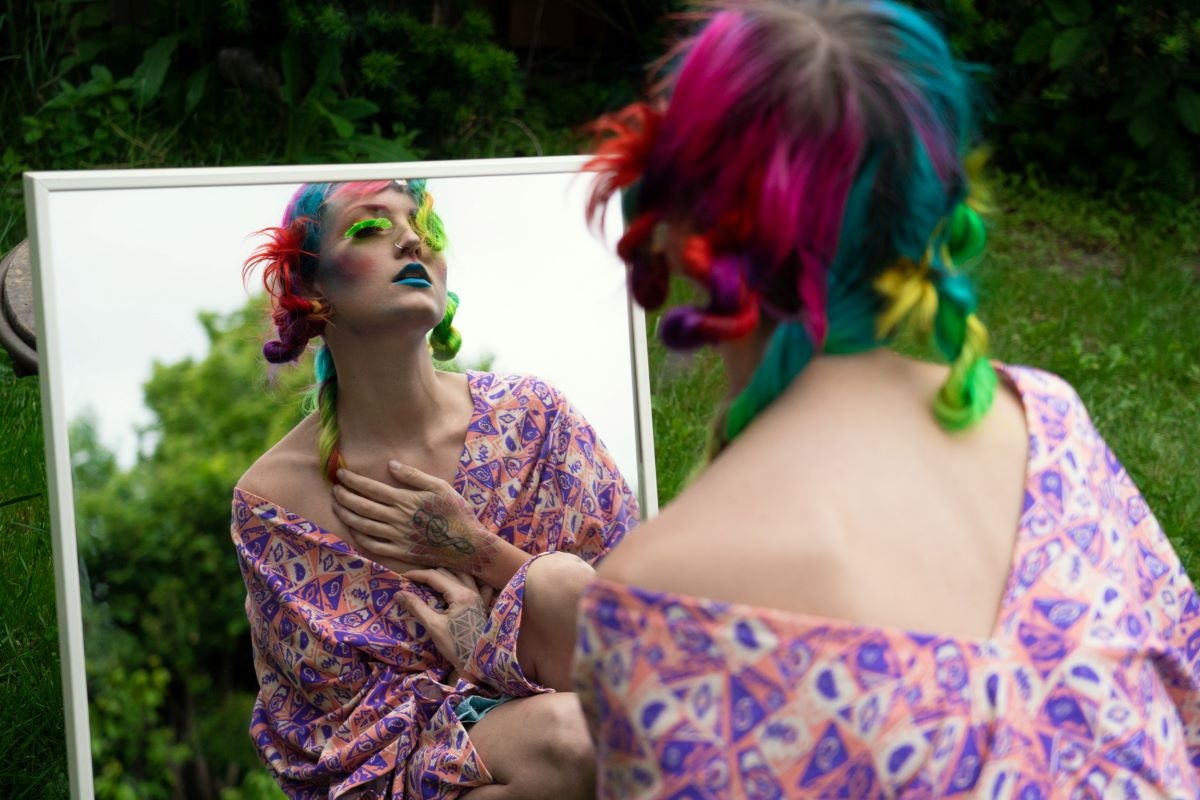
Alanna Sterling keeps the music going
Photo: Anndy Negative
The pandemic has affected artists in plenty of ways, but Alanna Sterling was able to let their music keep going. In the lead up to Sterling's latest record Mind/Matter (Mind Over Matter) they've dealt with recording through Covid regulations, personal injuries and having their own audience on the streaming platform Twitch evolve as everyone moves indoors. We caught up with Sterling in light of their latest single "Chemicals" to chat about streaming music content, writing and how playing a character actually helped them find themself as an artist better.
Ottawa Life: How have you found trying to build an audience playing music over Twitch, especially given the gig economy sea change of 2020?
Alanna Sterling: My Twitch experience started way back in 2018. And I started as a gamer, because it is a gaming website. But I was playing ukulele during one of my games, during my respawn time, and somebody came in my chat and said, "Oh wow, you can actually really sing and play. Why aren't you streaming music?" I thought, "Oh, why aren't I streaming music? That's what I want to do!" So I did my first music stream on March 28, 2018, and immediately I saw my viewer count go from maybe three people to about 15 watching. I figured this was something I could do when I wasn't playing shows in real life. I could do streams during the day and even practice new songs.
I got picked up by a talent show on Twitch called the Austin Show, and that put me in front of about 50,000 viewers in my second month of streaming. So it blew up my channel a bit. Ever since I've been streaming three to four shows a week, just watching it grow and connecting with my people. One of the big differences between a live gig and a stream is I can take breaks between my songs to chat and get to know every single person. It's not a room full of people where everyone is talking over each other, it's a chat box where I can read it all and see a name next to it. I can engage individually, but also to the group and a larger community. Discord (a community and gaming-focused equivalent to Skype) helps when I'm not streaming, so there we have game nights with the fans, we have a whole bunch of chat forums about mental health and disabilities, we've got a general chat for anything, you can post your cat pics if you want.
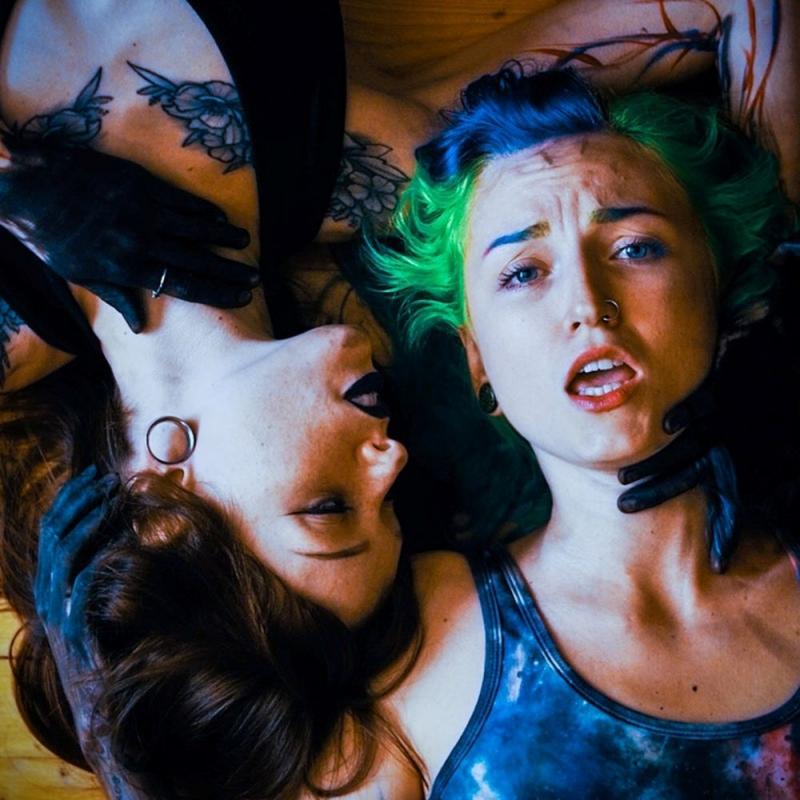
Photo: www.alannasterling.ca/music
Ottawa Life: So how did that evolve when the pandemic hit?
Alanna Sterling: I had big following going into the pandemic, so live-streaming was pretty much my full-time job. I was still gigging three times a week, so I lost out on a lot of income from my live gigs, that's where I sold CDs, made tips, I wouldn't have to pay for food because venues would cover that. I tried to stream more, I got really burnt out, because of course the music community on Twitch was very small when I started, there wasn't even a music community really. There was gaming, and there was IRL/Just chatting where you would go to the beach with your stream or do a cooking show, or music. It was essentially, gaming and other. After I joined, a few months later there were more and more music people coming to Twitch, and they added categories for musical performances, which helped push that forward. So now it's less just who has the most followers, and more of what is best for you based on your interests.
Since March a lot of other musicians who were doing gigs full-time, or did music on the side with a full-time job, they're all revenue-less. So that meant a lot of people turned to online streaming, I mean a lot of people. Probably thousands of new streamers, which was really cool, but it also diluted a lot of what was already there. You had these people dedicated to streaming music on Twitch for three-to-five years who fought to even get a Music category in the first place, and now these new people are doing it for fun. We all have to make money somehow so I have mixed feelings about it. So many people are broke right now, my Twitch income went down already because more people are trying to save money, and now thousands of people as competition. I was one of the fifty top music streamers and now it's all changing. It's tricky to grow with all the new talent, so you have to really try to stick out.
Ottawa Life: You've said your online persona actually helped you find your artistic voice more, so how did that come about?
Alanna Sterling: I've been playing music for my whole life, playing bars and pubs where I was essentially a human jukebox. I would do an hour set, take a break, hour set, and there was a bit of banter, but I ultimately felt it was a job, a fun job, but a job. With Twitch, people were there for you, not just for the music, they were there to get to know you, and hang out with you. After a few months, I would still do covers but people were starting to ask for songs that I wrote. I got to take long breaks and just chat with people who were there, and actually talk about what my songs were about. It helped me realize I have a lot more to offer than just my voice, or playing other people's songs.
I've been writing songs since I was 12 so having a whole group of people who not only enjoy my originals but constantly request them, and help me pay to record them really gave me a big sense of self-worth. It also meant I didn't have to sell out, and be something I'm not to get it done. It meant I could be myself and if they didn't like that, they would just find someone else. Finding people who liked me for me, unfiltered, with no facade. The character was just the true me, and Alanna Sterling was kind of a character before because I would try to win people over with what I thought they would like. MermaidUnicorn was more of a "I don't care what you think!" I'm a rainbow ball of energy, who's compassionate, completely honest to a flaw, and I'll just say how I feel while encouraging others to do the same. I realized maybe that character was who I was the whole time.
Ottawa Life: How have you found the process writing and recording Mind/Matter, and has it benefitted or suffered from the inherent shakeup of the pandemic?
Alanna Sterling: We started the album in 2019, which started before I broke my elbow while biking. I wasn't able to play music for a while, I actually just got the screws taken out of it. The accident pushed everything back, but it got me writing a bunch of new songs, especially around the trauma and the pain. We started recording songs in 2019 with the intention of finishing in October of 2019, and it just kept taking longer with new songs, and it morphed into a full twelve song album. I'd add trumpets, saxophone, we hired violinists, upright bassists. So when 2020 came around we had to figure out how to deal with all these people. We had a session with all the masks on, and it was really weird not being able to move between booths. We've had to cancel studio time with lockdown and just send mixes. I've had more free time but I've just spent it being a potato. I've had a lot of trouble focusing and dealing with the stress of trying to do something, when I also have to be responsible and stay home. For my producer Eric Eggleston, he's gotten more work, he's producing a TV show for Bell, and he's got all these projects. We've had two or three in-person sessions, all with masks, and I'm even bringing my own mics. It's weird but the final result will be really polished.
Ottawa Life: What did you find Eric brought to the table as a producer and how was filming part of his TV show?
Alanna Sterling: I'd worked with him on my last album, and he just brings something really unique to the table. He just has a way of imagining how things can sound. We sampled a water bottle for one of my songs, and turned it into a synth because I accidentally bumped it and it sounded cool. He's got a talent you can't find in Ottawa normally. It's always, what's next, what gives it a new dimension. Each song is a different experience for me, and he finds a new sound for that. I can ask him for an idea and he'll know exactly how to get there. As for the show, he's turned into a real paparazzo during recording just shooting everything, and asking to film something, he can turn anything into content.


